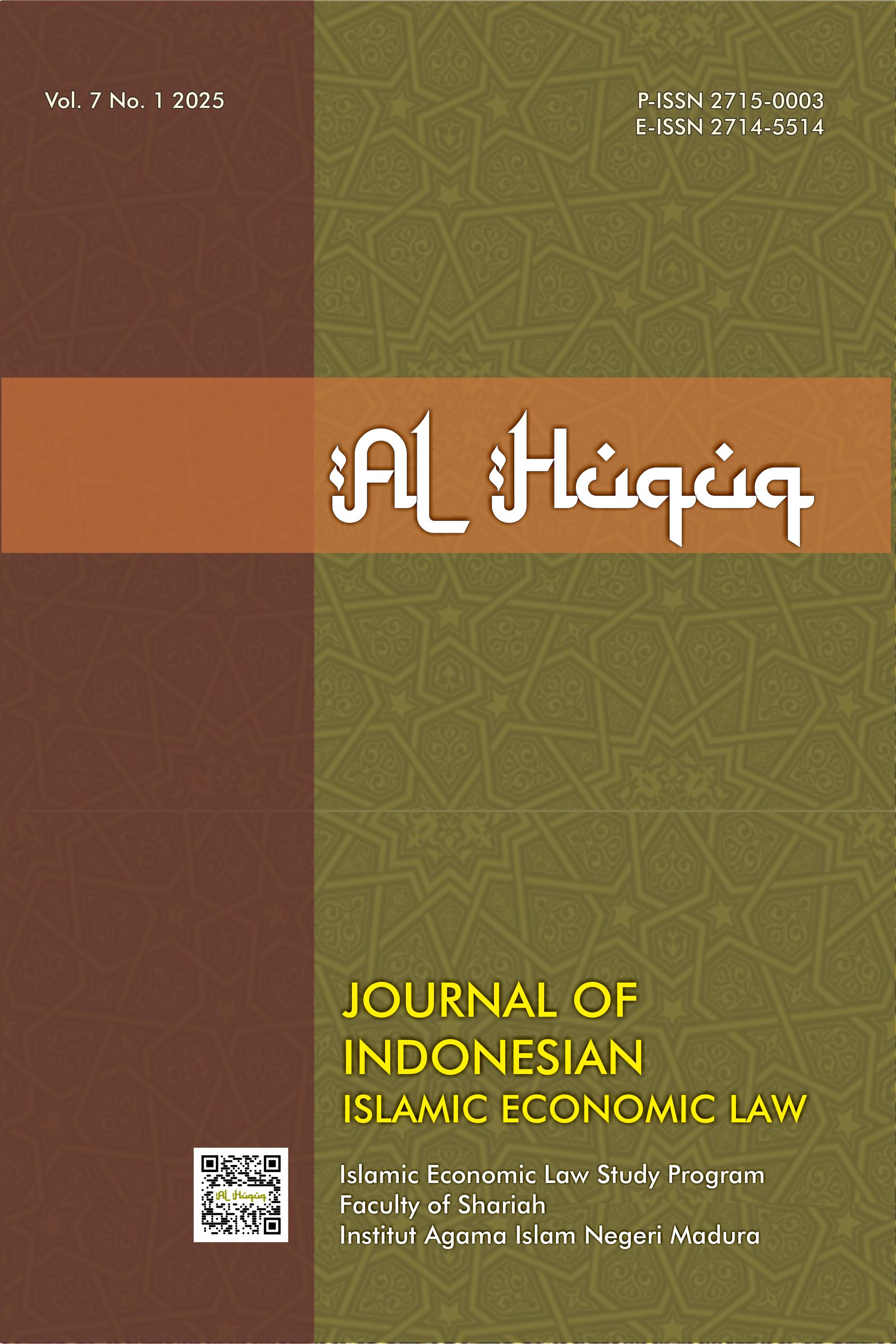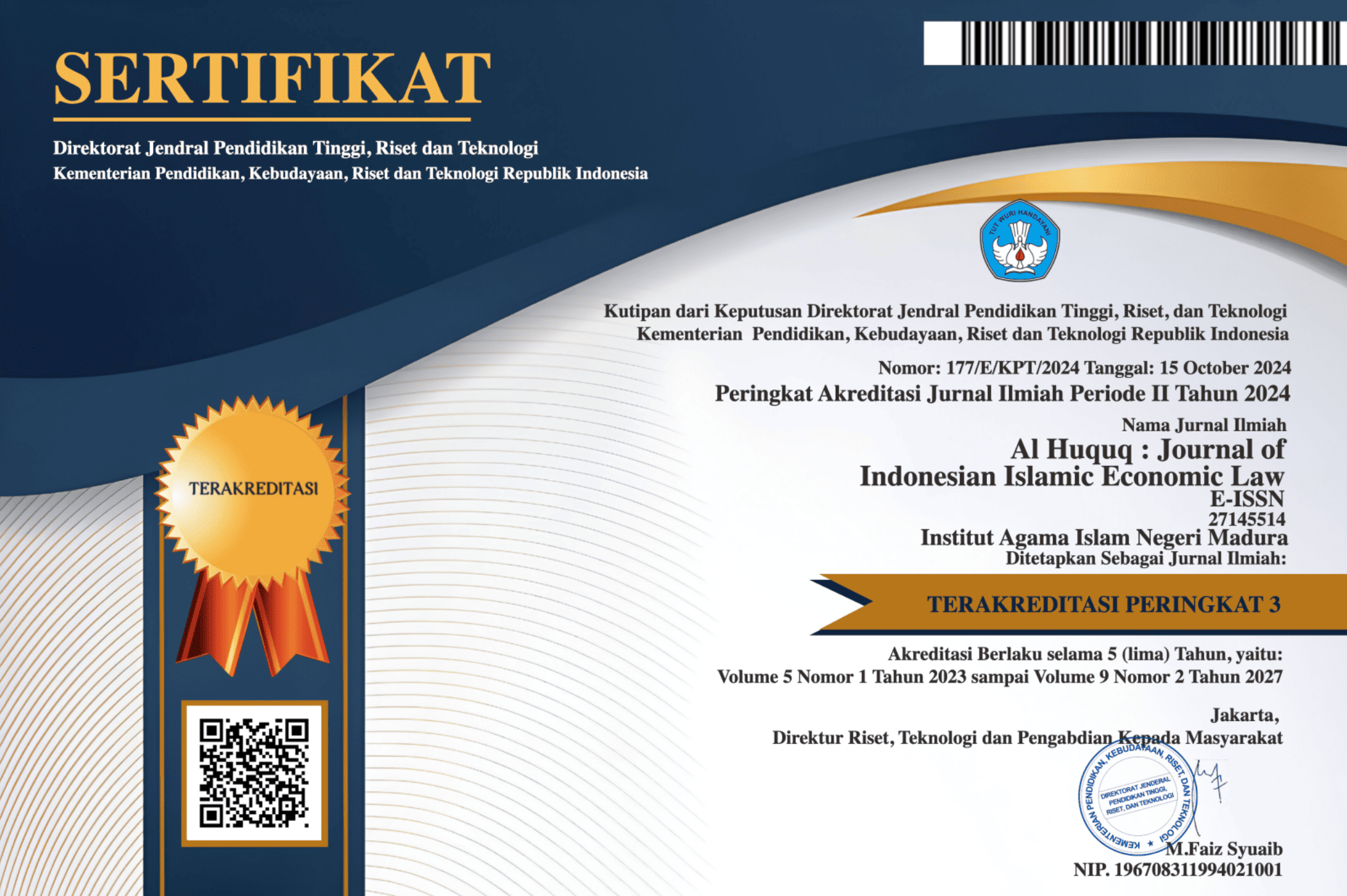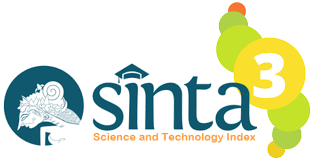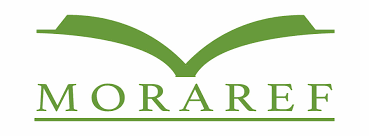Modelling a Strategy for Accelerating Halal Certification for MSMEs from The Perspective of Maslahah Mursalah
 Abstract views: 256
,
Abstract views: 256
,
 PDF downloads: 135
PDF downloads: 135
Abstract
This study aims to determine the strategy for accelerating halal certification for Micro, Small, and Medium Enterprises (MSMEs) in Bangkalan Regency using the Analytical Hierarchy Process (AHP) method, as well as to examine the strategy from the perspective of maslahah mursalah in order to provide maximum benefits for MSME actors and the wider community. This type of research is qualitative using the AHP (Analytical Hierarchy Process) approach with the research subjects of the Ministry of Religion, MUI, Halal Center UTM, Cooperative Office. The data used are primary data and secondary data with data collection techniques using interviews and questionnaires. Based on AHP analysis, the criteria that are very influential in the process of accelerating halal certification strategies in Bangkalan are the role of halal certification bodies, which obtained the highest weight of 0.514, compared to market demand with a weight of 0.280, awareness of business actors with a weight of 0.138, and the role of government with a weight of 0.068. From the perspective of maslahah mursalah, these strategies not only aim to fulfill the immediate needs of MSMEs and consumers for halal assurance but also serve the broader public interest by promoting social welfare, economic justice, and community trust. By prioritizing the role of halal certification bodies and enhancing awareness through socialization programs, the approach ensures that the certification process is efficient, transparent, and inclusive. This aligns with the principle of maslahah mursalah, which advocates for solutions that bring maximum benefit and prevent harm to society.
Downloads
References
Adiba, Elfira Maya, and Faizal Amir. “Prediction of MSMEs Interest for Halal Certification in Indonesia: Logistic Regression Approach.” Falah: Jurnal Ekonomi Syariah 8, no. 2 (2023): 18–31. https://doi.org/10.22219/jes.v8i2.24192.
Aprilia, Sifa, and Anita Priantina. “Analisa Strategi Peningkatan Sertifikasi Halal Sektor Kuliner Di Bangka Selatan.” International Journal Mathla’ul Anwar of Halal Issues 2, no. 1 (2022): 50–71. https://doi.org/10.30653/ijma.202221.46.
Arsil, Poppy, Rumpoko Wicaksono, Hety Handayani Hidayat, and Dian Novitasari. “Strategi Kerjasama Pengembangan Institusi Halal: Implementasi Pada Halal Center.” Jurnal Ilmiah Ekonomi Islam 8, no. 1 (2022): 590. https://doi.org/10.29040/jiei.v8i1.3794.
Badan Pusat Statistik Kabupaten Bangkalan. “No Title.” bangkalankab.bps.go.id, 2024.
Baso R, Nasrullah Bin Sapa, Cut Mutihiadin, Sumarni S. “Pentingnya Sertifikat Halal Dalam Perdagangan Internasional.” EKOMA : Jurnal Ekonomi, Manajemen, Akuntansi 4, no. 1 (2024): 3000–3013.
Choiri, Muttaqin, and Alan Su’ud Ma’adi. “Identifikasi Pemberdayaan Dan Sertifikasi Halal Pada UMKM Oleh Lembaga Zakat Di Bangkalan Madura.” AL-MANHAJ: Jurnal Hukum Dan Pranata Sosial Islam 5, no. 1 (2023): 787–96. https://doi.org/10.37680/almanhaj.v5i1.2289.
Engkus, Abdillah, Fauzan Hanif, Indri Apriyanti, and Kawthar. “Inovasi Pelayanan Sertifikasi Halal Gratis (SEHATI) Bagi Usaha Mikro Kecil Pada LP3H UIN Sunan Gunung Djati Bandung.” Dinamika : Jurnal Ilmiah Ilmu Administrasi Negara 10 (2023): 3–11.
Fadillah, Suci, Ina Syafrotul Munada, and Rizan Maulana. “Peran Pemerintah Desa Dalam Memfasilitasi Legalitas Sertifikasi Halal Dan Nomor Induk Berusaha Bagi UKM Di Desa Gambiran , Jombang , Jawa Timur.” Jurnal Abdi Masyarakat Indonesia (JAMSI) 4, no. 3 (2024): 757.
Fathurrozi. “Hasil Wawancara Dengan Pejabat Kementerian Agama Kabupaten Bangkalan Pada Tanggal 25 September 2024.” 2024.
Galuh Widitya Qomaro. “Tanggung Jawab Hukum Labelisasi Halal Pelaku Umkm Pangan Olahan Kemasan Di Bangkalan.” Al-Ulum Jurnal Pemikiran Dan Penelitian Ke Islaman 10, no. 1 (2023): 51–63. https://doi.org/10.31102/alulum.10.1.2023.51-63.
Jakiyudin, Ahmad Havid, and Alfarid Fedro. “Sehati: Peluang Dan Tantangan Pemberian Sertifikasi Halal Gratis Bagi Pelaku Umk Di Indonesia.” Al-Mustashfa: Jurnal Penelitian Hukum Ekonomi Syariah 7, no. 2 (2022): 182. https://doi.org/10.24235/jm.v7i2.10666.
Japar, Rahayu, Idris Paraikkasi, and Cut Muthiadin. “Peran Lembaga Sertifikasi Halal Dalam Membangun Ekosistem Halal... PERAN LEMBAGA SERTIFIKASI HALAL DALAM MEMBANGUN EKOSISTEM HALAL: TANTANGAN DAN PELUANG.” International Journal Mathla’Ul Anwar of Halal Issues 4, no. 2 (2024): 34–44.
Komsiyah, Siti. “Aplikasi Analytical Hierarchy Process (AHP) Pada Pemilihan Software Manajemen Proyek.” ComTech: Computer, Mathematics and Engineering Applications 5, no. 2 (2014): 870. https://doi.org/10.21512/comtech.v5i2.2292.
Laili, Dwi Nur Fadlilatul, and Fajar Fajar. “Analisis Problematika Pelaksanaan Sertifikasi Halal Bagi Pelaku Umkm Di Bangkalan.” Masyrif : Jurnal Ekonomi, Bisnis Dan Manajemen 3, no. 2 (2022): 147–55. https://doi.org/10.28944/masyrif.v3i2.789.
Muhlisin, Roziyan Adi, and Wicaksana. “PELATIHAN SERTIFIKASI HALAL DALAM MENINGKATKAN IMPULSIF BUYING PADA UMKM DI KECAMATAN KOTA SUMENEP.” Jurnal Pengembangan Dan Pengandian Nusantara 2, no. 01 (2024): 158.
Pertiwi, Salsabila Suci, Wiyono Sutari, and Sheila Amalia Salma. “Rancangan Skala Prioritas Kriteria Pemilihan Supplier Kain Pada Umkm Odelia Hijab Menggunakan Metode Analytical Hierarchy Process (AH).” Ekasakti Jurnal Penelitian & Pengabdian 4, no. 2 (2024): 296–301.
Priantina, Anita, and Safeza Mohd Sapian. “Sertifikasi Halal Di Indonesia Dari Voluntary Menjadi Mandatory.” Tasyri’ Journal of Islamic Law 2, no. 1 (2023): 95–1857118.
Rully Trihantana1, Ermi Suryani2, Puloh. “STRATEGI PENGENALAN MANAJEMEN SERTIFIKASI HALAL DALAM MENINGKATKAN KUALITAS PRODUK USAHA MIKRO KECIL DAN MENENGAH DI DESA CIBITUNG TENGAH, KECAMATAN TENJOLAYA, KABUPATEN BOGOR.” Sahid Empowerment Journal II, no. Oktober (2022).
Salam, D Q Alva, and Ahmad Makhtum. “Implementasi Jaminan Produk Halal Melalui Sertifikasi Halal Pada Produk Makanan Dan Minuman Umkm Di Kabupaten Sampang.” Qawwam : The Leader’s Writing 3, no. 1 (2022): 10–20. https://www.jurnalfuad.org/index.php/qawwam/article/view/110.
Sutrisno, Sutrisno, Nanny Mayasari, Mohammad Rohim, and Yoseb Boari. “Evaluasi Keputusan Kelayakan Bonus Karyawan Menggunakan Metode AHP-WP.” Jurnal Krisnadana 3, no. 1 (2023): 49–58. https://doi.org/10.58982/krisnadana.v3i1.491.
Usnan, Usnan, Aisy Rahmadani, and Kortis Luhut Maharani. “Problematika Dan Strategi Optimalisasi Sertifikasi Halal Di Indonesia.” Journal of Islamic Economics and Finance 2, no. 3 (2024): 100–110.
Yana. “Miliki Sertifikat Halal, Inilah Potensi Keuntungan Industri Bahan Baku.” LPPOM MUI, 2024.
Zulaikha, Siti, Enny Puji Lestari, Ani Nurul Imtihanah, and Mujib Baidowi. “Urgensi Pemahaman Dan Kesadaran Produk Halal Pelaku Usaha Di Kota Metro.” Jurnal Hukum Dan Ekonomi Syariah 12, no. 1 (2024): 2528–0872. https://doi.org/10.32332/adzkiya.v12i1.9352.
Copyright (c) 2025 Al-Huquq: Journal of Indonesian Islamic Economic Law

This work is licensed under a Creative Commons Attribution-ShareAlike 4.0 International License.















